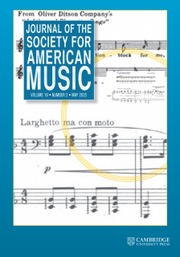No CrossRef data available.
Article contents
George Rochberg's Road to Ars Combinatoria, 1943–63
Published online by Cambridge University Press: 05 April 2018
Abstract
George Rochberg often attributed his postmodern shift to the death of his son in 1964. Accordingly, the literature has described his practice of ars combinatoria (“art of combination”) as an “abrupt about-face”—a sudden rejection of modernist aesthetics. But the composer's unpublished essays, diaries, correspondence, and musical sketchbooks suggest that the road to ars combinatoria had well-laid roots in two of his least considered biographical periods: his service during World War II and his serial period. During these two decades, Rochberg actively sought positive models for humanistic composition, historical figures who rose to the level of musical heroes in that they served humanity through their art. But as the war had taught him, heroes are necessarily defined by their struggle against nemeses in ethical conflicts. Correspondingly, he constructed the other side of the artistic world as a realm of vain egoists who sought self-promotion and seemed unconcerned with humanistic modes of expression. As his ideas matured, Rochberg assigned different figures to these archetypes, but the guiding ethical criteria remained fairly consistent throughout. I therefore argue that ars combinatoria was less a sudden aesthetic reversal than it was the result of a longer cumulative process of self-assessment and compositional maturation.
- Type
- Research Article
- Information
- Copyright
- Copyright © The Society for American Music 2018


